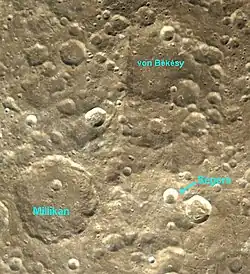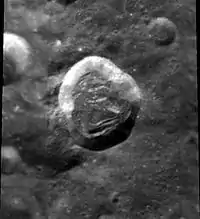Segers (crater)
Segers is a small lunar impact crater that is located on the Moon's far side. It lies about one crater diameter to the east of the much larger crater Millikan. To the north of Segers is von Békésy.
 Segers crater | |
| Coordinates | 47.1°N 127.7°E |
|---|---|
| Diameter | 17 km |
| Depth | Unknown |
| Colongitude | 233° at sunrise |
| Eponym | Carlos Segers |
Segers is unusual in that all of its satellite craters have a larger diameter. It is roughly circular in outline, with a bowl-shaped interior. The rim is not significantly worn due to impact erosion, and the edge remains sharp. The inner wall has a relatively high albedo, giving the crater a bright appearance.
Satellite craters
By convention these features are identified on lunar maps by placing the letter on the side of the crater midpoint that is closest to Segers.
| Segers | Latitude | Longitude | Diameter |
|---|---|---|---|
| H | 46.7° N | 129.0° E | 29 km |
| M | 44.5° N | 127.6° E | 54 km |
| N | 44.0° N | 127.5° E | 27 km |

Clementine mosaic of Segers H (larger than Segers and located east of it)
References
- Andersson, L. E.; Whitaker, E. A. (1982). NASA Catalogue of Lunar Nomenclature. NASA RP-1097.
- Blue, Jennifer (July 25, 2007). "Gazetteer of Planetary Nomenclature". USGS. Retrieved 2007-08-05.
- Bussey, B.; Spudis, P. (2004). The Clementine Atlas of the Moon. New York: Cambridge University Press. ISBN 978-0-521-81528-4.
- Cocks, Elijah E.; Cocks, Josiah C. (1995). Who's Who on the Moon: A Biographical Dictionary of Lunar Nomenclature. Tudor Publishers. ISBN 978-0-936389-27-1.
- McDowell, Jonathan (July 15, 2007). "Lunar Nomenclature". Jonathan's Space Report. Retrieved 2007-10-24.
- Menzel, D. H.; Minnaert, M.; Levin, B.; Dollfus, A.; Bell, B. (1971). "Report on Lunar Nomenclature by the Working Group of Commission 17 of the IAU". Space Science Reviews. 12 (2): 136–186. Bibcode:1971SSRv...12..136M. doi:10.1007/BF00171763. S2CID 122125855.
- Moore, Patrick (2001). On the Moon. Sterling Publishing Co. ISBN 978-0-304-35469-6.
- Price, Fred W. (1988). The Moon Observer's Handbook. Cambridge University Press. ISBN 978-0-521-33500-3.
- Rükl, Antonín (1990). Atlas of the Moon. Kalmbach Books. ISBN 978-0-913135-17-4.
- Webb, Rev. T. W. (1962). Celestial Objects for Common Telescopes (6th revised ed.). Dover. ISBN 978-0-486-20917-3.
- Whitaker, Ewen A. (1999). Mapping and Naming the Moon. Cambridge University Press. ISBN 978-0-521-62248-6.
- Wlasuk, Peter T. (2000). Observing the Moon. Springer. ISBN 978-1-85233-193-1.
This article is issued from Wikipedia. The text is licensed under Creative Commons - Attribution - Sharealike. Additional terms may apply for the media files.